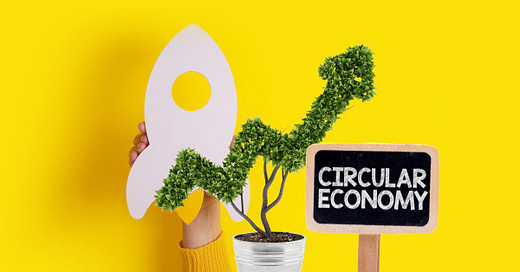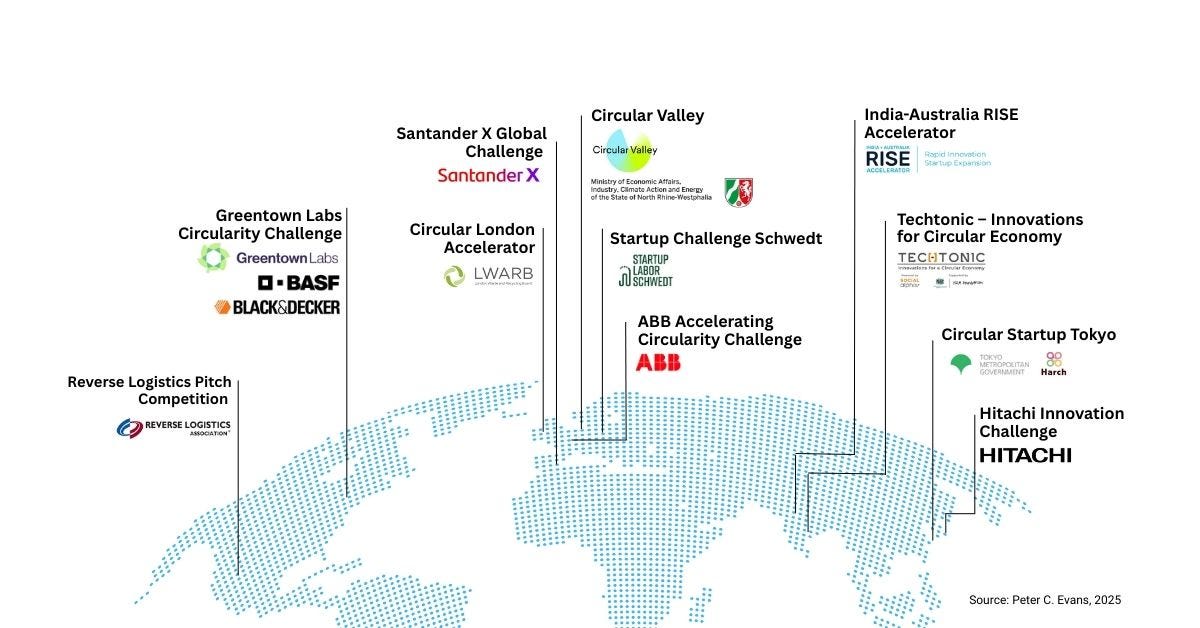Circular Economy Startup Challenges and Incubators
Government, Corporation, Foundation and Trade Association Support
Circular economy startups face various challenges. One of the primary hurdles is access to capital. These startups often struggle to secure funding due to the perceived risks and longer return timelines compared to traditional businesses. Most VCs prioritize investments in companies with shorter return timelines and proven market fit, which align more closely with linear economic principles.
Competition with linear businesses poses another challenge. Established linear companies benefit from economies of scale, brand recognition, and entrenched market positions, making it difficult for circular startups with smaller resources and less market power to compete. Linear businesses often resist adopting circular practices due to vested interests in existing systems, further complicating the competitive landscape for startups.
Circular economy startups can also face regulatory barriers. Current regulatory frameworks are often misaligned with circular economy principles, creating obstacles for waste reuse or product-as-a-service models. For instance, waste classifications and product standards may not accommodate recycling systems, and unclear permitting processes can discourage investment in recycling infrastructure. Legal barriers, such as unclear property rights for waste, also hinder the development of circular practices.
Investing in Circular Economy Startups
Various programs have been launched overcome these barriers and support the growth of circular economy startups. These include programs launched by governments, foundations, and companies, some working together and others independently.
The motivations behind these programs vary. Governments are driven by a desire for environmental solutions, aiming to address pressing issues such as waste management, resource depletion, and climate change by fostering circular economy innovations. Additionally, governments seek to accelerate the economic transition from linear to circular models, reducing dependence on virgin resources and promoting local industries. This shift also helps ensure regulatory compliance with stricter environmental regulations and extended producer responsibility (EPR) frameworks. Furthermore, circular economy initiatives create opportunities in recycling, remanufacturing, and sustainable design, contributing to economic growth and job creation.
Several companies have launched circular economy startup challenges. Some examples include such as ABB, BASF, Hitachi, and Santander. These programs are motivated by environmental, social, and governance (ESG) commitments. These corporations see the potential for new revenue streams by integrating circular innovations into their supply chains or product offerings. Supporting sustainable startups also enhances corporate image and builds trust with environmentally conscious consumers and investors. Moreover, by backing startup challenges, companies gain access to new technologies and business models that can be integrated into their operations or scaled globally.
Foundations, on the other hand, seek opportunities for mission-driven impact. Organizations like the H&M Foundation support circular economy challenges to balance environmental sustainability with social equity. For example, their initiatives in India aim to improve waste picker incomes while addressing waste management. Foundations often serve as early-stage supporters of high-risk innovations that align with their mission to promote sustainability and social responsibility. They also foster cross-border partnerships to address global challenges like waste reduction and climate change through scalable circular solutions.
Trade associations have also begun to back circular economy startups. For example, the Reverse Logistics Association hosts a reverse logistics pitch competition that is open to startups whose focus is on reverse logistics or returns and is less than five years old. Judges pick a one-year RLA Bronze Membership (valued at $4,999). Attendees pick a one-year RLA Copper Membership (valued at $2,999). Trade associations like the RLA would back circular economy startups for several strategic and practical reasons. This program aligned with the RLA's core mission. By supporting startups that innovate in areas like recycling, refurbishing, and reusing materials, the RLA directly aligns with its goal to reduce waste and maximize value across supply chains.
The mix of organizations and motivations highlights the growing recognition of the circular economy as a pathway toward economic and business innovation.
Figure 1. Circular Economy Challenges
Support Programs for Circular Economy Startups
Here is a brief description of eleven programs aimed at supporting circular economy startups (Figure 1).
Circular Valley (Federal State, Germany)
Circular Valley, established in 2021 in the Rhine-Ruhr region of Germany, runs a two-month accelerator program aimed at fostering circular economy startups. This initiative provides tailored mentoring, workshops, and networking opportunities with over 160 partners from industry, research, and government. Focus areas include plastics, packaging, vehicles, batteries, electronics, textiles, construction materials, food, and water. To date, Circular Valley has supported over 100 startups globally, with a strong emphasis on material loops and chemical recycling innovations.1
Startup Challenge Schwedt (National and State Government, Germany)
The Startup Challenge Schwedt promotes climate-neutral circular economy innovations through two funding phases: up to €25,000 for pilot project development and up to €300,000 for implementation in industrial settings in Schwedt/Oder. It aims to accelerate industrial transitions toward sustainability by supporting pioneering solutions in energy efficiency and resource management.2
Circular London Accelerator (Government and Foundation, United Kingdom)
Circular London Accelerator is the UK's first dedicated circular economy startup accelerator, co-designed and delivered by the London Waste and Recycling Board (LWARB) and the Carbon Trust. Focusing initially on the built environment sector, the program equips promising startups with the necessary knowledge, resources, and connections to succeed. It has generated significant outcomes, including £2.6 million in venture capital and grant funding for its cohort, with an additional £1.2-2 million in further funding in the pipeline. The accelerator facilitated 14 pilot projects with major corporates, enhancing collaboration and innovation in circular solutions.3
Circular Startup Tokyo (City government and media company)
Affiliated with the Tokyo Metropolitan Government’s TOKYO SUTEAM initiative and operated by Harch Inc., this program incubates startups specializing in circular economy practices. It leverages Harch’s "Circular Economy Hub" platform to promote sustainability-focused business models and innovations.4
ABB Accelerating Circularity Challenge (Industrial company)
Launched in 2023, ABB’s challenge awards $30,000 to each of the three winning startups to develop waste-reduction concepts. The program focuses on designing out waste and pollution while regenerating natural systems through collaboration with ABB experts. It highlights ABB’s dedication to advancing circularity within industrial processes6. So far ABB has held one challenge. It is not clear if or when it will back another circularity challenge.5
Greentown Labs Circularity Challenge (Incubator and industrial companies)
Greentown Labs runs a six-month accelerator program in partnership with BASF and Stanley Black & Decker. The program focuses on plastics recycling, energy storage innovations, and circular material solutions. Startups benefit from mentorship and resources aimed at developing scalable technologies that contribute to a sustainable future.6
Hitachi Innovation Challenge (Industrial company)
Since its launch in 2020, Hitachi has focused on reuse and recycling solutions for food packaging through its Innovation Challenge. The program fosters collaborations with startups that drive sustainable resource management practices, showcasing Hitachi's commitment to environmental stewardship.7
Santander X Global Challenge (Financial Institution)
Banco Santander offers €120,000 in prize money through its Circular Economy Revolution challenge. This program targets startups and scaleups from 11 countries working on innovative circular economy solutions such as recycling technologies and eco-friendly products. Winners gain access to Santander’s exclusive X 100 global network and Fintech Station for collaboration opportunities.8
India-Australia RISE Accelerator (International government collaboration)
The nine-month RISE Accelerator supports environment-focused startups expanding between India and Australia. Its first-round concentrates on circular business models, B2B/B2C supply chain circularity, waste reduction innovations, and material replacements. This initiative bridges cross-border collaboration for sustainable entrepreneurship.9
Techtonic – Innovations for Circular Economy (International foundation collaboration)
Organized by Social Alpha in collaboration with H&M Foundation’s Saamuhika Shakti initiative, Techtonic accelerates waste management innovations while improving waste picker incomes. The program aligns economic empowerment with environmental stewardship goals.10
Reverse Logistics Pitch Competition (Trade association)
The Reverse Logistics Pitch Competition was held in Las Vegas, as part of the Reverse Logistics Association’s Conference and Expo. This competition offered awards such as RLA Bronze Membership ($4,999 value) and RLA Copper Membership ($2,999 value). It emphasizes reverse logistics solutions for managing product returns efficiently while fostering innovation within the circular economy.11
Conclusion
The initiatives demonstrate a significant and growing commitment to supporting circular economy startups. Governments, foundations, companies, and trade associations are increasingly recognizing the crucial role these startups play in disrupting traditional linear models and driving sustainable change. These programs provide vital resources, mentorship, funding, and networking opportunities, helping circular startups overcome challenges related to capital access, competition, and regulatory hurdles.
However, while these efforts represent a promising start, scaling the circular economy requires more initiatives and a larger pool of capital. To truly foster a thriving ecosystem, it is essential to build a large network of companies, investors, policymakers, and research institutions, to advance circular solutions.
More initiatives are needed to launch and scale circular platform startups. Circular platforms have a great chance of becoming "green unicorns," or startups valued at over $1 billion.12 One of the primary reasons for this potential is their scalability and market demand. Circular platforms, such as marketplaces for refurbished or recycled goods, enable transactions at scale by connecting buyers and sellers. Their modular technology, network effects, and ability to target a wide range of markets them highly scalable. Successful examples include Back Market and Vestiaire Collective, which have achieved unicorn status by leveraging circular principles in consumer electronics and fashion.
Sources






This is really insightful Peter. Thanks for this great job